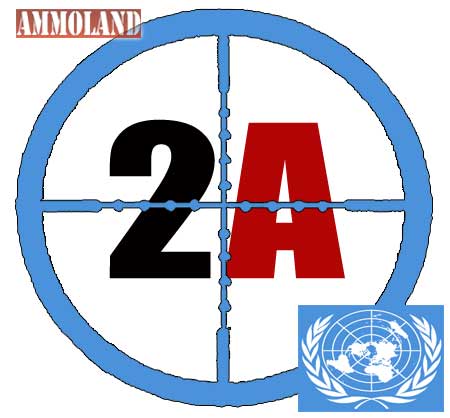By Ted R. Bromund, Ph.D.


Washington, DC –-(Ammoland.com)- The U.S. has announced that it will sign the U.N. Arms Trade Treaty (ATT) as soon as it is satisfactorily translated into all official U.N. languages.
This could happen as early as August 28th 2013, when the Russian-language translation is scheduled to be completed.
It is more likely to happen on September 25 2013 at a high-profile signing ceremony currently being planned at the U.N.
Once the U.S. signs the treaty, and even without the advice and consent of the Senate, the U.S. will consider itself obliged not to violate the treaty’s object and purpose.
The top 10 reasons why the U.S. should avoid putting itself in this dangerous position by not signing the ATT are:
- A broken red line. In October 2009, then-Secretary of State Hillary Clinton stated that the U.S. supported negotiation of the ATT only by “the rule of consensus decision-making.”[1] In the U.N., “consensus” means “unanimity.” But after negotiations failed to achieve consensus, the ATT was adopted with U.S. support in April 2013 by a majority vote in the U.N. General Assembly. The U.S. thus broke its own red line. To protect its national interests, the U.S. often participates in negotiations only if they are conducted on the basis of consensus. The U.S.-backed turn to the majority-rule General Assembly reinforces a damaging precedent that will be cited in the future against the U.S.
- A rushed and short-circuited review. The treaty became available on April 2. On April 5, Assistant Secretary of State Thomas Countryman stated that the U.S. review process for it would take “months, at a minimum.”[2] But on May 15, a mere six weeks later, while that review was ongoing, he announced that the U.S. would sign the ATT. Thus, the U.S. review was extremely rapid and effectively cut short before it was concluded.
- An “ambiguous” treaty. On April 5, Countryman rightly described the ATT as “ambiguous.” The treaty defines none of its terms or defines them only by reference to other undefined terms. The treaty is a conveyor belt that will pull along its signatories—including, potentially, the U.S.—as the meanings of its terms are defined.
- Amendments by majority rule. The treaty can be amended by a three-quarters majority vote. These amendments are binding only on nations that accept them, but the amended treaty will be used to pressure the U.S. to comply in practice with amendments it refused to accept in principle. This makes the ambiguity of the treaty more dangerous.
- Bad for the U.S. arms export process. This process is governed by Presidential Decision Directive 34, issued by President Bill Clinton in 1995. The essence of the U.S. process is that it considers a broad range of criteria as a whole. The treaty, on the other hand, contains many prohibitions and assessment criteria that make it more akin to a checklist that must be met item by item. Over time, this checklist will become only more restrictive, further hampering the conduct of U.S. foreign policy.
- Bad for the Second Amendment. The treaty does not exclude lawfully owned civilian firearms and contains only a weak preambular reference to civilian ownership. It creates a “responsibility” to prevent the “diversion” of firearms to the illicit trade, sets out national record-keeping on the identity of end users—i.e., individual owners—of imported firearms as a best practice, and offers justifications for imposing new administrative burdens on significant firearms imports into and exports out of the U.S. market. As the treaty is interpreted and amended, both the U.N. agencies that explicitly promote gun control and the many nations that wanted the ATT to impose even tighter domestic restrictions will pull and pressure the U.S. toward imposing further regulations.
- Bad for the Reagan Doctrine. The treaty raises significant legal barriers against arming the opponents of totalitarian regimes. This practice is known as the Reagan Doctrine, but it has been a bipartisan instrument of U.S. foreign policy since 1945. Since the treaty will not, in practice, prevent totalitarian regimes from arming terrorists and other dictators, it offers the U.S. nothing except tighter controls on the world’s democracies.
- Bad for export control reform. The current U.S. system of export controls is responsible but also baroquely complex. Reforms are under way to improve the U.S. system. These reforms would place tighter controls on fewer items, especially sensitive ones. But the campaign for the ATT seeks to expand the number of items covered by the treaty both through the treaty’s amendment procedure and by taking advantage of its ambiguity. The conflict between these aims can be postponed but not evaded, and the clash between them is not likely to be good for the U.S. system.
- Bad for U.S. sovereignty. The standards at the heart of the ATT—which are based on international humanitarian law, international human rights law, and a knowledge test—are vague and readily subject to redefinition. The treaty as a whole is, as its supporters openly acknowledge, intended to create international norms that will restrain the conduct of the U.S. both by shaping the operation of the policy process and by establishing a pretended customary international law standard that will influence the deliberations of U.S. courts. This is bad for the ability of the U.S. to govern itself under the Constitution.
- It will not work. The ATT nominally seeks to control the illicit international trade in arms. This makes as much sense as trying to control crime by outlawing it. Terrorists and dictators around the world are regularly armed directly by, or with the tacit acquiescence of, members of the U.N., frequently in violation of U.N. Security Council arms embargoes. The treaty was negotiated by the same nations that are responsible for these violations. Another serious problem is that many nations are unable or unwilling to control their own borders, secure their own stockpiles, or even keep members of their armed forces and police departments from selling their firearms. The treaty will not transform these incompetent nations into well-governed and law-abiding ones.
The U.S. Should Not Sign the U.N. Arms Trade Treaty
The ATT is already intermingled with other U.N. institutions, several of which the U.S. has long been skeptical about on Second Amendment grounds, including the Programme of Action on Small Arms and the International Small Arms Control Standards. As a recent statement by the U.N. Secretary General put it, the U.N. sees a “synergistic relationship” between the ATT and these other institutions and expects the ATT “to lend strong impetus” to their implementation.3 The coming years are likely to see an incremental, interpretive convergence between the ATT and these institutions in ways that will be difficult to monitor, much less control.
The U.S. decision to support negotiation of the ATT in principle was unwise. The U.S. decision to vote for the ATT in the U.N. General Assembly was even more unwise. Placing the signature of the U.S. on the ATT would be the most unwise act of all.
—Ted R. Bromund, PhD, is Senior Research Fellow in Anglo–American Relations in the Margaret Thatcher Center for Freedom, a division of the Kathryn and Shelby Cullom Davis Institute for International Studies, at The Heritage Foundation.
About Heritage Foundation
The Heritage Foundation is the top conservative think tank in the United States. Their blog starts your morning off right with “The Morning Bell,” a blogpost that brings you up to speed on current issues, and then updates you throughout the day on a variety of issues concerning conservatives. Visit: https://blog.heritage.org
About Ted R. Bromund, Ph.D.:
Ted R. Bromund studies and writes on British foreign and security policies and Anglo-American relations as senior research fellow in The Margaret Thatcher Center for Freedom. He also explains why America must defend and advance its unique leadership role in the world. Visit: https://blog.heritage.org/author/tbromund/ to read more.
